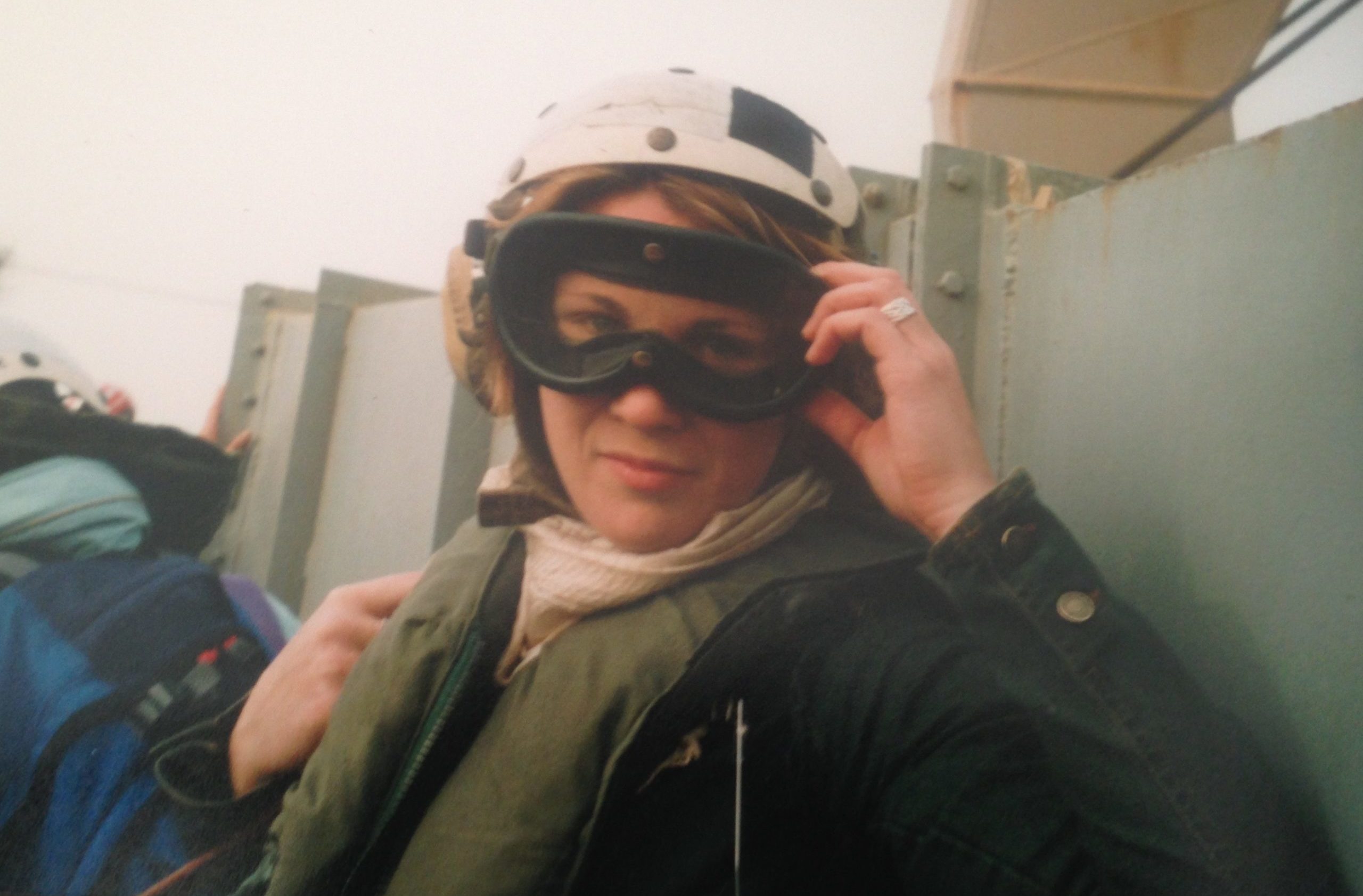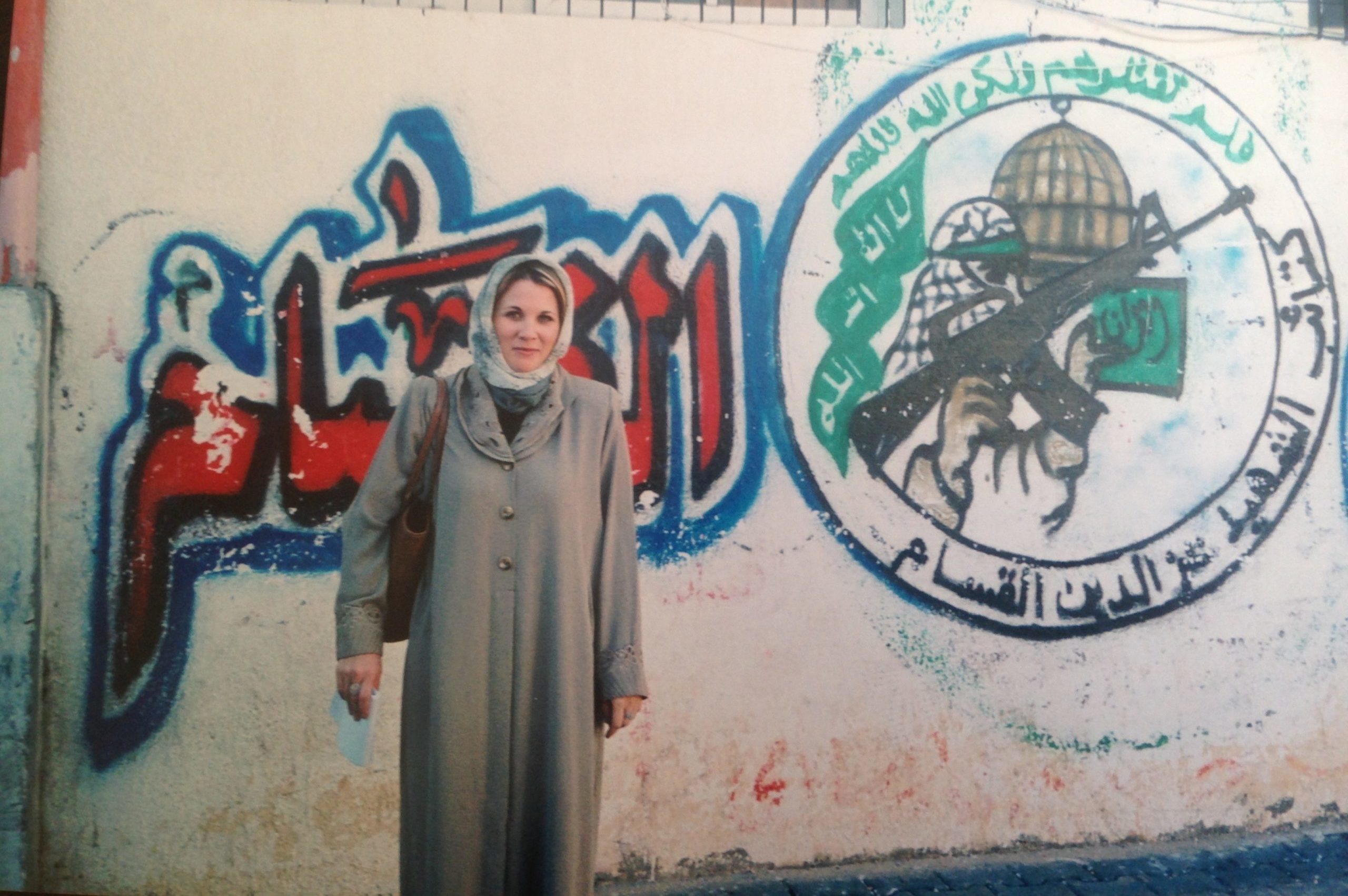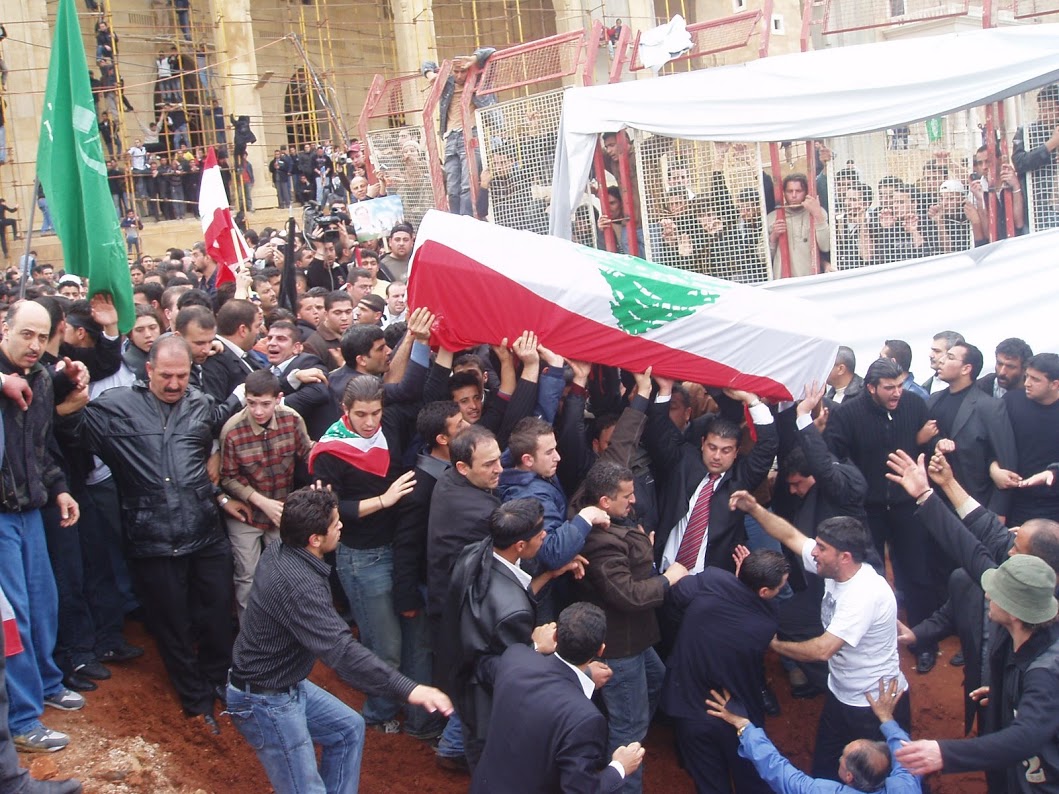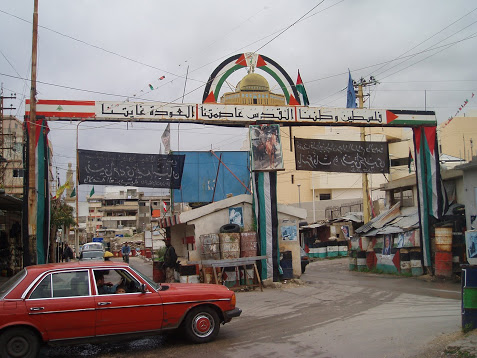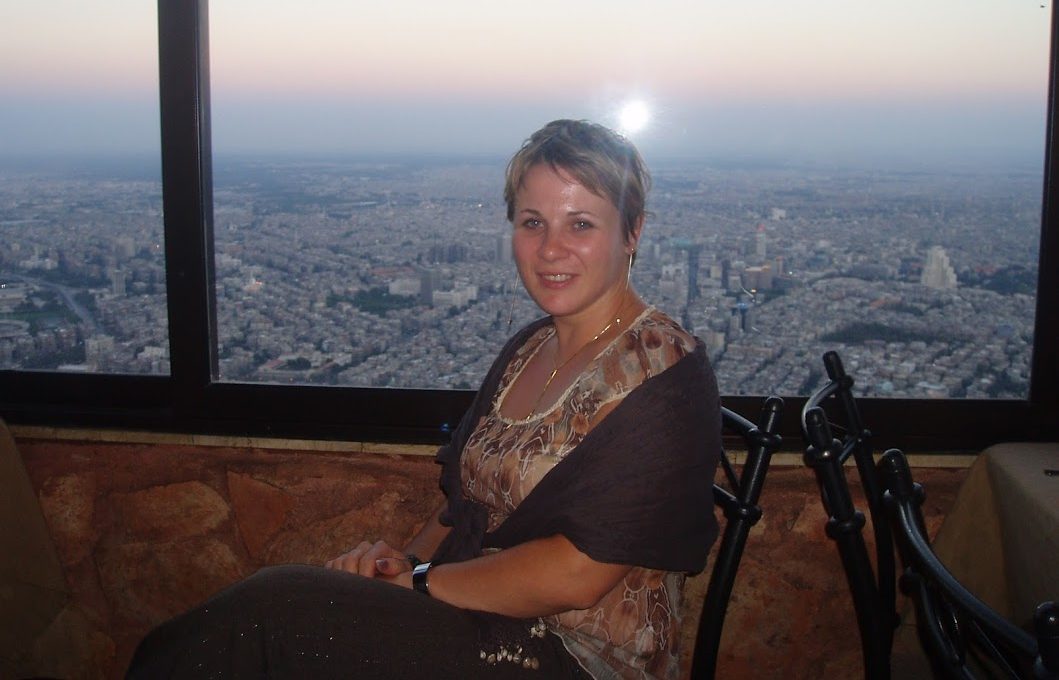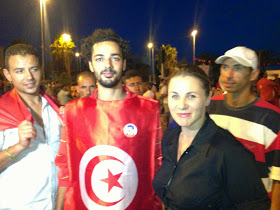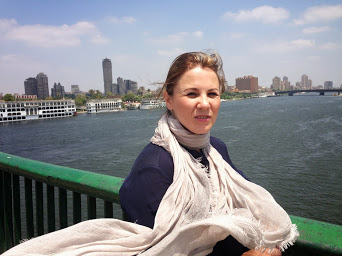Blindfolded in Damascus and separated from her team. Stepping into a Jewish cemetery in Libya. Confronting Sheikh Yassin, Hamas’s founder, in the Gaza Strip.
Fearless and determined journalist Ksenia Svetlova retraces a journey that few men and women have taken through Middle Eastern countries at a time of heightened tension and explosive fear.
Born in Moscow in 1977, Svetlova knew she wanted to be a journalist from a very young age, and was infatuated with the Middle East. In 1991, she emigrated with her mother and grandmother from Moscow in the former Soviet Union to Israel where she earned university degrees in journalism and Middle Eastern studies.
Svetlova was Arab affairs correspondent for Israel’s Russian-language Channel 9 television, has written for The Jerusalem Post, BBC in Russian, and numerous international news agencies.
In 2015, she was elected to Israel’s parliament as a representative of the Zionist Union party, serving on the prestigious Foreign Affairs and Defense Committee and the Committee for Immigration and Absorption.
After her term ended in 2019, she became a senior research fellow at the Institute for Foreign Policy and Strategy led by Gen. (ret.) Amos Gilad at the Interdisciplinary Center at Herzliya. Svetlova also directs a program on Israel-Middle East relations at the Mitvim think tank.
She is married and has three daughters, including twins.
In her first English-language interview, Ksenia Svetlova shares her story with The Media Line’s Felice Friedson. A full transcript follows the video.
The Media Line: If you didn’t know the author of On Heels in the Middle East, you might assume Ksenia Svetlova to be an elderly writer looking back on decades of work. But, while it is certainly clear that Ms. Svetlova has gone where few women or men have ventured, nowhere do we see reason to believe we’re looking at anything but a work in progress. Journalist, former member of the Israeli parliament, teacher, I’m delighted to welcome you to The Media Line for your first English-language interview on your exciting and newly released book, On Heels in the Middle East.
The geographic scope of your travels reads like an international thriller. As an Israeli and Russian stepping into the Middle East in Syria, Lebanon, the Gaza Strip and Egypt, were you ever afraid?
 [1]
[1]Journalist and former MK Ksenia Svetlova poses with her new book, On Heels in the Middle East. (Courtesy)
Svetlova: I think, in the beginning of the uprisal, and eventually the places that I did go, I depicted in the book. I was working with my own paranoia. I was fearing for being followed. It made me feel very much uncomfortable, because I am an Israeli. I am not like the journalist who can travel from, I don’t know, New Jersey, or from Rome or from Moscow and, like, basically being themselves. You know, I have these two identities and I cannot let go of any one of them.
TML: Bahrain has been in the news these past months. For you, it must bring up memories of being on an aircraft carrier off of its coast during the Second Gulf War in 2003. Tell us how that came about.
Svetlova: I remember reporting to Channel 2 from the bushes of the Diplomat Hotel in the center of Manama, but I had to go like to the most secluded area where nobody could hear me because I was thinking if somebody would find out that I am speaking Hebrew now for the Israeli media outlet, what will happen? Maybe the same [thing] that happened to Itai Engel in Kuwait. He was prior to myself in Kuwait and it was published by Asharq Al-Awsat that there is an Israeli who is now broadcasting from the midst of the Persian Gulf, from Kuwait, and he had to leave very quickly, because he was fearing for [his life].
TML: How has Bahrain changed since then?
Svetlova: Well, I think that the past 20 years they slowly built this atmosphere of acceptance of this idea of having peaceful relations with Israel. I covered it and I was astonished by the change that I felt that came soon after the war in the Gulf. There was this feeling that this weakening of the Arab-Sunni world, which began, of course, with I think 9/11. You can take it as a starting point and then into the war in the Gulf when Iraq was basically eliminated as a major Arab Sunni power. And then into this string of events that ends with the Arab Spring or begins with the Arab Spring. It depends on how you look at it.
It brought the Arab regimes in the region here, especially those in the Gulf, to understand that Israel is not an enemy. Many of them were thinking that already before, because you remember the peace initiative of King Faisal back in 1981. So, he was proposing something very similar to the Arab Peace Initiative back then. But then it came to [the] Arab Peace Initiative and then it came to basically reaffirming their peace initiative despite what is happening here with the Palestinians, and then, of course, the big headline is the Abraham Accords, but prior to that you had 20 years of quiet relationship of trade, [and] of cooperation in the security field.
I know personally many Israelis who were traveling for years and years to the Emirates and also to Bahrain.
TML: And beyond…
Svetlova: And beyond. And Saudi Arabia, of course. So, as we hear today that the Israeli prime minister can take a flight and hop to Riyadh and meet the crown prince there, we need to understand what had happened to the Arab Sunni world during these two decades. You see the eruption of forces that is destructive to the Arab regimes, most of all, like ISIS, but you see also the democratization forces that are also destabilizing that. They need to reinvent themselves somehow. They need to reinforce their treaties with the United States from one side and also with powerful regional allies like Israel.
TML: Readers will see some familiar, famous and infamous personalities in the pages of your book. As a journalist, you interviewed numerous Arab leaders from Yasser Arafat to Amr Moussa, chairman of the Arab League. What were the defining moments meeting them?
Svetlova: Well, one of the defining moments I think for me, was interviewing Sheikh Ahmed Yassin, the leader of Hamas. First of all, it happened in late February 2004, a few weeks before he was actually liquidated by the IDF. The decision was made already by the time that I interviewed him. I got a call from Gaza, from one of the friends, journalists, and he said, “Well, today is the day that you can score it if you come to Gaza right now, I mean within the next two hours.”
And I’m in the midst of my driving test in Jerusalem. It’s I think my fifth attempt to get the driver’s license and I’m like, OK, I’m not doing the test, bye. And as I gather my jeans and sweater and traveling to Gaza, and taking a taxi and going to the Gaza Strip, and as a journalist you are focused on the questions that you want to ask.
I was thinking like, oh my God! I just met the pure evil. The pure evil. He also said it in the interview: “We will fight you until doomsday. We will continue making the terrorist attacks.” He didn’t call it, of course, terrorist [attacks], “amaliyat” [operation] in Arabic. “We will do, we will be fighting you, and we consider everybody as a soldier.”
It’s the terrorist organization that it always was and its intention is to chase the Jews from this land, part of the land or all of the land, but this is actually what they want to do. So, I think you can learn a lot from this kind of interaction with these leaders.
TML: Is there one interviewee you would like to have back for five minutes to ask one more question? What would it be?
Give the gift of hope
We practice what we preach:
accurate, fearless journalism. But we can't do it alone.
- On the ground in Gaza, Syria, Israel, Egypt, Pakistan, and more
- Our program trained more than 100 journalists
- Calling out fake news and reporting real facts
- On the ground in Gaza, Syria, Israel, Egypt, Pakistan, and more
- Our program trained more than 100 journalists
- Calling out fake news and reporting real facts
Join us.
Support The Media Line. Save democracy.
Svetlova: Wow! I think I would ask Yasser Arafat. I would ask Yasser Arafat, “Do you see what is happening 16 years after you’ve gone? Your people are miserable. Your people are divided. You could have done all of this differently. Why didn’t you do this? Why didn’t you do this? Why didn’t you take this step towards the peace of the brave that you were talking about with Yitzhak Rabin and then with Ehud Barak. Why didn’t it happen? Look at the outcome. Look at the misery you brought.
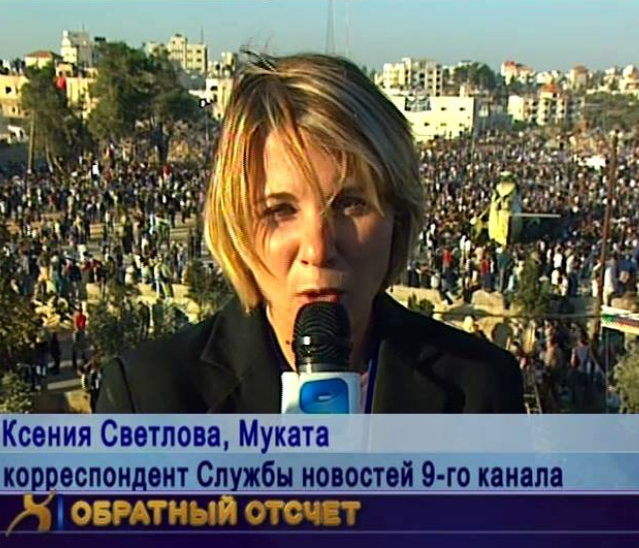 [5]
[5]Ksenia Svetlova reporting from Palestinian Authority President Yasser Arafat’s funeral in Ramallah, Nov. 12, 2004. (Courtesy)
TML: You were the last female journalist to interview Hamas founder, Sheikh Ahmed Yassin before he was assassinated by Israel in one of the early targeted killings. You asked him if the disengagement was a victory for Hamas. What did he say?
Svetlova: And I think it was basically a big mistake on the part of the decision-makers here in Israel. Instead of marketing this as a joint attempt of the Palestinian Autonomy led already by Abu Mazen already at the time, and Israel, of some kind of attempt to make things right and achieve peace. What they did is they just cut it unilaterally and they allowed Hamas to absolutely take the full credit for this achievement, and it resulted in the victory of Hamas.
TML: Any frequent traveler knows things don’t always go as planned. In 2005, you were entering Lebanon for the first time, but you almost didn’t enter beyond passport control. What happened?
Svetlova: So, regarding Lebanon, I had a bigger plan than just going to Lebanon. I also wanted to go to Syria. I was able to enter Lebanon, but the problem was at the Syrian border. I was going there with a few friends; journalists that I met during my work coverage of the Rafic Hariri assassination and then the Ashura events in southern Lebanon. When I get to the border, they tell me that you can enter, but you will not be able to go back to Lebanon.
OK, all of my stuff are in Lebanon and I need to go to Lebanon eventually because my flight ticket is from there, and I’m saying to them but why? And they’re saying because of your Russian passport it’s kind of a problem. Too many women want to cross the border and go here and there, and suddenly I understand that he implies something there. Yes, if you have [a] Russian passport, then probably you want to work in Lebanon. We are talking about a Lebanese soldier and I want to tell him, “Listen, I’m not what you think. I’m not a Russian call girl. I’m an Israeli journalist.” And then I understand, no, it’s better to shut up about this actually in this very moment. So, I didn’t go to Syria at that time. I went to Syria one year later when I was shooting a film together with one of the Russians, actually Russian Jewish producers about Islamic terrorism and we ended up in Damascus eventually, but not [at] that time.
Basically, going into Lebanon it’s a journalistic luck. I call it a journalistic luck. I [had] planned to go to Lebanon. I had this kind of confidence of a 27-year-old.
TML: Well, you were there when Rafic Hariri was killed.
Svetlova: Yes, I was sitting in the apartment of my father drinking tea with him two years before I was supposed to go to Lebanon, to Beirut, and then suddenly I understand, I hear the news, something about Lebanon. I turned up the volume a little bit and I hear that Rafic Hariri was just murdered in the midst of Beirut while driving with his entourage.
The first thing I thought, well how luck am I because I have a ticket to Beirut. In 36 hours, I am supposed to be there. And you are not a journalist at all, because as a journalist they would not let me in. That’s the thing. I didn’t have any accreditation. I was writing for Kommersant at the time, the Russian Kommersant, I was writing for Gazeta, one of the Russian media also, but I was not accredited in Lebanon, so it was a kind of risky adventure going there as a journalist with my small Olympus minicam of orange color and trying to make the best of it.
At the end, I arrived a few hours before the funeral of Rafic Hariri and I witnessed what you can call the Cedar Spring. The uprisal of the Lebanese who were so shocked by this political murder. I also saw the Lebanese youngsters who were lighting the candles exactly like the Israeli youngsters used to do with Yitzhak Rabin after his assassination.
TML: Many Palestinians reside in Lebanon, but without the status of citizens. They live in refugee camps. One of the most notorious of which is Ain al-Hilweh in South Lebanon. It was there where you met Munir al-Makdah, a senior Fatah leader who founded the Al-Aqsa Martyrs Brigade, one of the most lethal groups. Describe the camp and the meeting.
Svetlova: When I try to think about this place, first of all, I think about misery. How much misery I saw there! It was also the day. He was speaking. He was protected by this special glass cube, but he was still there by himself. And of course, it was during a time that he could [go out]. Of course, there is a correlation between what happened in the seventh century with Hussein and between the struggle that Hizbullah is waging against Israel, and the Shia is waging against Israel, Iran and so on. He combined it all together and then suddenly [there are] 100,000 throats shouting “Death to Israel,” almawt li’israyiyl. I’m standing there and I’m just like I don’t want to be there at this moment, you know, because this is of course very interesting as a journalist.
TML: Were you afraid?
Svetlova: I was not afraid at this moment because I knew that I’m OK. They do not recognize me as an Israeli, yes? But it was very difficult. It was because the air was filled with hatred, and I also saw the lips of some of the Lebanese reporters moving when they [chanted]. They were standing a little bit aside, but when you see these crowds shouting “Death to Israel,” some of the Lebanese reporters are just with their lips and repeating these words. This, again, is very hard to be next to people who hate you, not you personally, but your people, your nation, your state. And what does it mean? Because I’m living here. I’m not going anywhere. Not me and not my kids and not my family.
TML: Ksenia, two Israeli journalists are invited to hear Gadhafi’s plan for peace between Israel and the Palestinians. It’s May 2005. You’re one of them. You managed to see an ancient Jewish cemetery there. Were you able to photograph it?
Svetlova: Well, I was asked specifically by the Libyan Jewish community if I will end [up], if I will find myself eventually in Libya. I met all of the Jewish groups, by the way, a long time ago before it became fashionable. I thought that it’s very interesting to hear their stories and basically to underline that there’s a Jewish presence everywhere here in the Middle East. When people are telling us, the Jews, the Israelis, you do not belong here, look around you. Look at the synagogues. Look at the Jewish cemeteries. Look at the graves of the [Jewish] prophets that are everywhere in Iraq and beyond.
So, of course Jews are a part of this region. They were always a part of this region and when I was meeting the group from Libya, basically the Diaspora meeting that they had once, and I told them, “Listen, I don’t know, but there might be a chance that I will go to Libya.” And they said if you do, please go to the cemetery in the city of Zliten. It’s next to the city of Zliten and it is abandoned now. We don’t know what happened to it and even if it even exists [today].
So, I was guest officially of the Gadhafi-led think tank that was called and it doesn’t exist anymore of course, just like Gadhafi himself, the Institute for the Research of the White Book.
In order to photograph the very famous Sufi shrine of Al-Ahmar that is there and when we were just on the way out, I said to them let’s make a little detour because there is a Jewish cemetery and I need to photograph it for some friend in Italy, a Libyan Jew.
And they really didn’t want to go there. Eventually we found this place. There was only one guy, an old guy, a Libyan peasant that we met and he said, “Yes, yes, yes, I remember. There were a lot of Jews here once.” He was maybe 80 years old so he remembered. And this Jewish cemetery, it was shattered. It was all crushed. It was a very sad thing to see, because unlike, for example, in Syria, unlike some other places like in Tunisia and Morocco, in Libya Gadhafi basically gave a green light to take everything that belonged to Jews, including the tomb graves, including the stones on the graves. And the local people used it.
You saw that it was intentional. It was the effort of the human being to crush the graves to take some parts of the stone home and there was only one grave that was intact by the name of Kahlon, so I took it when I took a photo of it and brought it to [Israeli Member of Knesset] Moshe Kahlon some months after that and he recognized it as a tomb of one of his relatives.
TML: It’s 2006 and you interview Ismail Haniyeh, the leader of Gaza. [It was] one of the last times that you actually went in [to the Gaza Strip]. Why did Haniyeh speak with you?
Svetlova: I found myself covering the Palestinian elections. There was so much disgust [with these] elections that took place by January 25 of 2006. And you know, not myself and also not Ismail Haniyeh, nobody expected that this would be the result. The clear leader in this race was Fatah, of course, and some of the people that I interviewed, there was some kind of red light because they told me, “Listen, we hate the Fatah because they are corrupt, because they fill their pockets with our money.” And you understand that this is the extreme poverty. This is the corruption. Corruption, corruption, corruption. And you can look all over the Middle East – and Israel is not an exclusion of that – how dangerous corruption is, and what kind of consequences it may have for various countries and various political movements.
TML: The Yarmouk refugee camp was recently back in the news. Over one year ago, the remains of Zachary Baumel, an Israeli soldier missing in action in the 1982 Lebanon War, was apparently found in that camp and returned to Israel. What do you believe is the backstory?
Svetlova: In the year 2013, 2014, 2015 in fighting between the government forces and the terrorist organizations that found shelter in this refugee camp. And you know, it was leveled. I think with this soldier [Zachary Baumel] is that the Russian security forces knew all along where he is and they decided to let the information out when it was it was comfortable for both Moscow, and for Benjamin Netanyahu, the prime minister shortly before the elections.
OK, so, it was not a coincidence. I mean, it doesn’t belittle the act of bringing back the fallen soldier. Not at all! But of course, the coincidence of releasing this info straight like before the very important and crucial elections here, makes you think of other political moves behind the heroic and sometimes the warfare isn’t going which, again for me was like, first of all, its iconic. Second of all, it’s something I studied as a young student of the Middle East, and the place that I thought I would never see in my life, so it was like historical for me.
And then I ended up going through Old Damascus and I ended up [there] by mistake, [as] I didn’t know where it is and I was also afraid to ask, but I ended up in the Harat al-Yahud, in the Jewish Quarter, and I knew it also from books, from pictures. I recognized some of the places and I was astonished to see that there was some construction work that was going on there on fancy boutique hotels.
Some of them later become incredibly beautiful boutique hotels and others were just a work in process, but I understood, well, first of all, that the Syrian regime had high hopes at that time. They were thinking that they can also play with this game with Iran and Hizbullah, but also be friends with the United States, so it was this time.
So, it was the time when the Syrian regime also had high hopes of developing their tourism sector, and it was, of course, underdeveloped. There were few good hotels in the city [of Damascus], and suddenly you have this chance and they reside in the Jewish Quarter.
And then I ended up going through Old Damascus and I ended up [there] by mistake, [as] I didn’t know where it is and I was also afraid to ask, but I ended up in the Harat al-Yahud, in the Jewish Quarter, and I knew it also from books, from pictures. I recognized some of the places and I was astonished to see that there was some construction work that was going on there on fancy boutique hotels.
Some of them later become incredibly beautiful boutique hotels and others were just a work in process, but I understood, well, first of all, that the Syrian regime had high hopes at that time. They were thinking that they can also play with this game with Iran and Hizbullah, but also be friends with the United States, so it was this time.
So, it was the time when the Syrian regime also had high hopes of developing their tourism sector, and it was, of course, underdeveloped. There were few good hotels in the city [of Damascus], and suddenly you have this chance and they reside in the Jewish Quarter.
TML: Historic brokered deals between the UAE, Bahrain and Israel has filled media since August. Just how far do you see the momentum carrying change in the region?
Svetlova: First of all, I think these deals they are a result of not only changing policies, but of changing realities here in the Middle East. The strive of Iran to hegemony. The weakening of the Arab system in general. I’m talking about, for example, the Arab League, Arab institutions, Arab states that some of them became failed states, some of them do not exist anymore. There is a name only, but there is no state there. I think all of that brought to the current situation in which you have first of all the size and importance of the Palestinian-Israeli conflict diminished in comparison to what it used to be for the last 50 years, so it was blown out of proportion. And today I think it is undermined so we are still not there. It will still follow us and we will still have to somehow resolve this, but I think it’s a great thing for the region and I think it’s a great thing for Israel, because yes indeed we have a common enemy; even two.
I would say that one enemy is Iran and another one is of course the Muslim Brotherhood axis. Both of them are threatening our security. Both of them are threatening stability here in the Middle East and these things need to be stated very clear[ly].
TML: Let’s step back to Tunisia, where the Arab Spring kicked off in 2011. By 2013, you do a democracy check.
Svetlova: First of all, Tunisia I think, when we are looking at this map of the Arab Spring and what happened where, why did Arab Spring erupt in Tunisia first of all, yes? It’s a question that’s not being asked enough, I think, yes? Everybody forgot about Tunisia very quickly because it was Egypt, because it was Syria, and the heart of the Middle East, but Tunisia was always different. It had the middle class, that was absent for example, in Egypt and also in Syria.
In Syria, there were some traces of the middle class, the merchants and so on, but not really. Most of the people were very, very poor. They had these independent institutions such as the trade unions, women’s unions and so on. It was all not existent in other places in the Arab world, and therefore they had also much more rights for women than any country here in the region, and they become successful. This was quite a smooth transition from Zine El Abidine [Ben Ali] rule to the democratic rule that they have right now.
TML: There is a shift now in Tunisia.
Svetlova: There is a shift now, and we will be looking at it very closely, but until this day, they [the Jews of Tunisia] were able to get over where there is no possibility to get out and change their lives. They could leave [already] years ago. They could leave to Israel. Many of them have been to Israel. They could leave to France, to the United States. Anywhere. They prefer to stay.
TML: What is the size of the population there now?
Svetlova: I think it’s 1,400 people, more or less. Some families are leaving; some families are coming back, which is very interesting. People that are making aliyah to Israel and then [they are] deciding to come back. Also, to Morocco there is this phenomenon of people that they feel more comfortable. They feel despite all of the dangers, despite…
TML: People that are immigrating.
Svetlova: Immigrating, and then they are coming back. No matter what, because … I understand it as an immigrant myself. I understand that even if you are living a long time in your new homeland and so on and its your historical homeland and there is this religious meaning, sometimes you are just …
How do you feel about that? He says, “You know, I’ve been to Israel. I don’t like the national security situation.”
TML: How is Egypt different today?
Yes, there is sexual violence in Egypt that is happening and it affects hundreds of Egyptian women. How come it will not affect the foreign journalist women there? It’s still not a reason not to go there, but you have to know how to handle yourself, how to protect yourself. How to escape from dangerous places when you feel for a second that you are being in danger. I left, I left. I didn’t stay. I preferred to go into some building and to observe from afar a little bit the situation, and not to be in the midst of the crowd because I do not know what would be happening if I would stay there.
TML: On Heels in the Middle East – it’s a must-read; it’s a real read. And, Ksenia Svetlova, it’s been a pleasure to have you this long time to really delve into your book so that others can understand the Middle East a lot better.
Svetlova: Thank you very much! It was a pleasure to talk to you, to talk to a colleague and somebody who is in love with the Middle East just like I am.
TML: Thank you!
Svetlova: Thank you!
